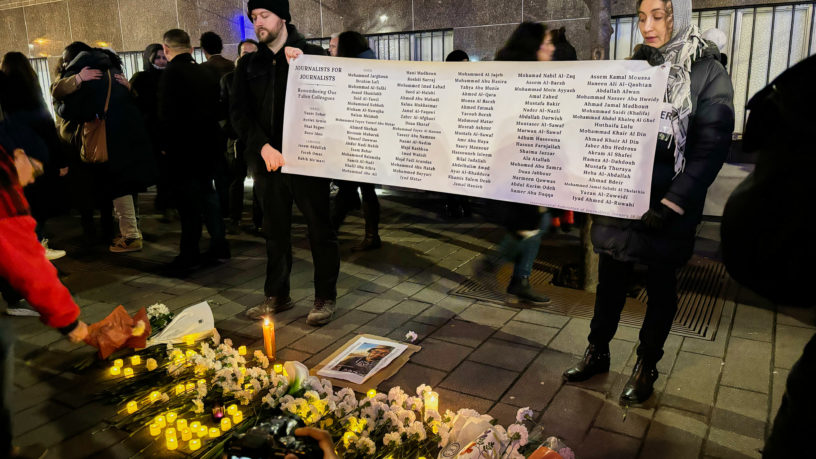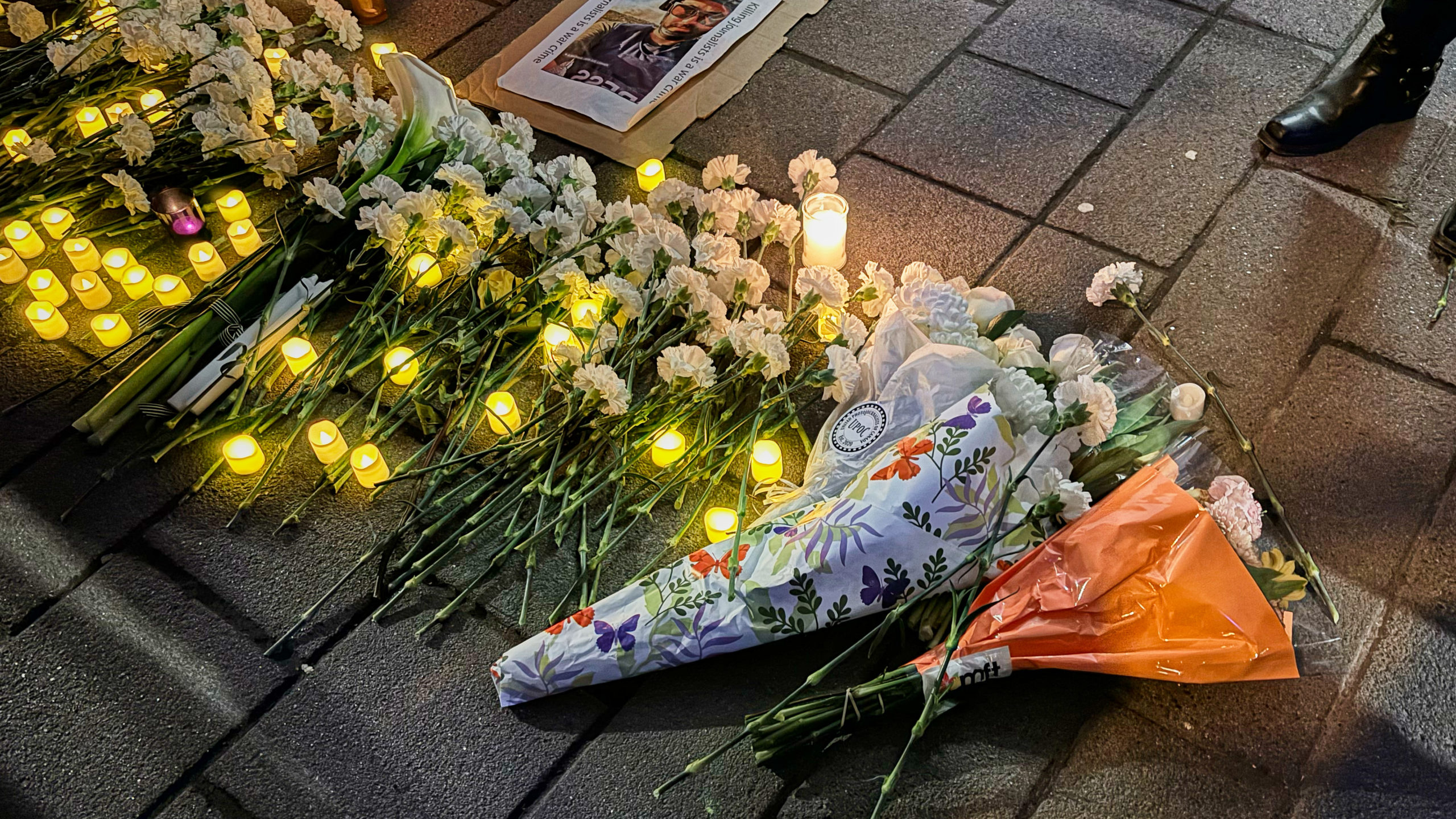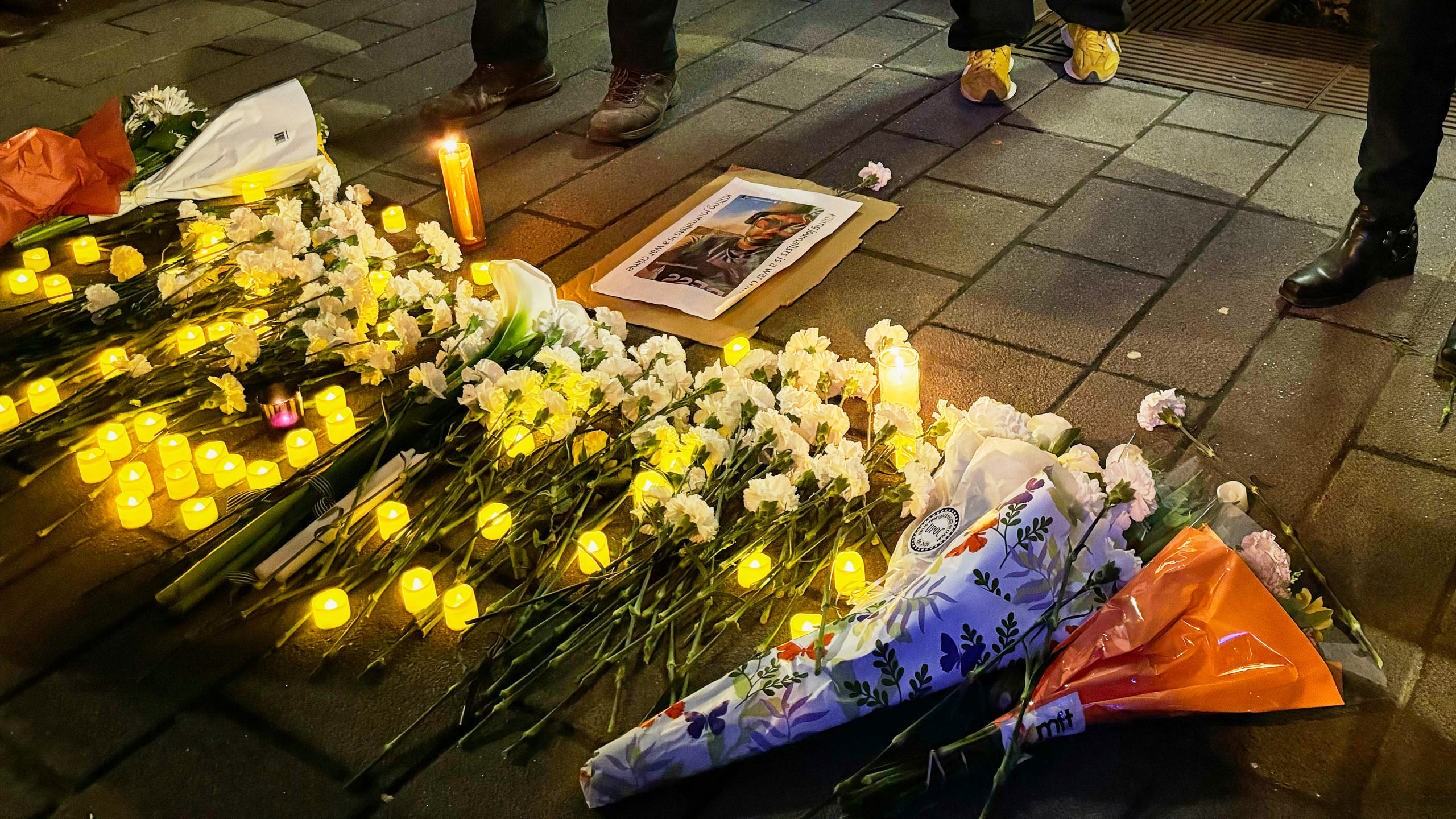By Gabriela Silva Ponte
A vigil was held at Toronto Metropolitan University (TMU) on Thursday to honour 83 journalists who were recently killed in Palestine, Israel and Lebanon.
The vigil named “Journalists for Journalists” gathered over 150 individuals at Bond and Gould Streets on the university’s campus.
Attendees were encouraged to lay flowers and candles in front of the names of the documented journalists who have lost their lives since Oct. 7, 2023—others brought posters and signs.
Although 83 journalists had been reported killed in the region at the time of the event’s preparation, the Committee to Protect Journalists (CPJ) reports 85 have been killed as of Feb. 2. This comes after ongoing tensions in the region escalated in early October last year, according to the CPJ. The committee has declared this period the deadliest time for journalists in recent decades.
“The Israel-Gaza war has taken a severe toll on journalists,” CPJ’s website states.
By comparison, 68 journalists were killed in the entirety of the Second World War, according to Freedom Forum, which can be found on the CPJ’s website.
TMU journalism instructor Peter Kuitenbrouwer was also in attendance at the event. He said the fact that more journalists had been killed in the war in the Middle East than in the Second World War was a “pretty shocking statistic.”
“It’s pretty sobering to hear those names read and maybe it’s good for journalists to think about the fact that this is not an easy profession and it has consequences. You can lose your life for doing what you do for a day job,” he said.
A moment of silence was held at the event for 83 seconds—one second for each journalist killed.
Light refreshments were then served at The Venn in the Rogers Communications Centre.
The vigil was held in partnership with the Canadian Press Freedom Project, the InSpirit Foundation, Amnesty International, stitched! and TMU’s School of Journalism.
Vigil co-organizer and independent journalist Pacinthe Mattar said there were some fears surrounding the event.
“Our first fear was that people’s feelings on this would be so strong that [they] would feel compelled to disrupt [the vigil],” she said.
Mattar added that she wasn’t sure how many individuals would show up due to fears of reprisal from their employers. She said she reached out to bosses in newsrooms to ask them not to penalize their staff for attending such an event.
“As journalists, we’re not supposed to protest, we’re not supposed to organize, we’re not supposed to have opinions or take a stand, we’re not supposed to publicly gather,” Mattar said.
“But right now, journalists are the story and I would say, specifically journalists within Gaza, are paying the highest toll that any journalists in recorded history have ever paid for journalism.”
She said she hopes journalism students know they are still welcome despite how difficult the current industry is.
Ravindra Mohabeer, chair of TMU’s School of Journalism, echoed Mattar’s sentiments.
“Approach things fairly, accurately and with accountability. If you do so, people will not always agree with you. [But] you’re not seeking agreement, you’re seeking the ability to share things with them,” he said. “Hopefully, [our students] see that the work that they do is not work that’s done in isolation, even if often it can feel that way.”
He said it was important for students to have a venue like this.
“The reason that we as a school decided to support [this event] is because there are very few venues aside from informal ones or workplace venues where journalists can come together in places and around topics that are not otherwise sanctioned,” Mohabeer said.
He also said the number of journalists killed showcases a problem.
“Safety for journalists is a paramount, fundamental right and obligation that we, as a society, have to foster,” Mohabeer said. “If we don’t stand up for it now, nobody will stand up for it later.”
He added that the university wanted to ensure this was a safe space and mentioned bringing in campus security.
“What we knew is that if we were centring it on an appropriate thing that was foundationally unimpeachable, then we were being thoughtful and careful,” Mohabeer said. “We had to put a lot of trust into the organizers of the event and they were very good about delivering on that trust.”
But Mohabeer said the worry surrounding the event did not come from a place of fear.
“Were we worried about the event? Sure. But in a cautious and thoughtful, proactive, positive way,” he said. “It was never controversial to think that safety for journalists should be the fundamental message.”
Others, such as third-year journalism exchange student Nina Yaminaah Daneshvar, had no fears about the event.
“I think it’s important for us to take a stand and show that when journalists are being targeted, you’re limiting the [spread of information],” she said. “Killing innocent people—no matter what—is wrong. You shouldn’t be fearful of standing up for people [being] killed, it should come naturally for you to show solidarity.”
“Regardless of where you stand in this conflict, the death of journalists is something that’s got to concern, certainly, every journalist. But also everybody in the community needs to raise their voice and say something about it because it’s unacceptable. These people are not combatants, they’re trying to get the story and none of them deserve to die,” Kuitenbrouwer said.
Even those who do not attend the school came out to the vigil.
Christian Zdravko, who is in his third year of journalism at the University of Toronto, said this kind of event spreads awareness and brings journalists together.
“It’s very rare to get a group of journalists like this so to allow that connection goes a long way,” he said. “I think it was great that we were able to do this. It’s a great way of commemorating journalists and journalism and it’s good for the community of [them] in Toronto.”
Daneshvar was sitting across from Zdravko when she chimed in.
“It’s very refreshing to see that there’s so many people who are like-minded,” she said. “It’s important to stay neutral but sometimes, when wrong is wrong, you shouldn’t feel ashamed of standing up for it.”
And Mohabeer agrees.
“It is not always easy to have difficult conversations, but it is always easy to think of difficult conversations as impossible,” he said.












Leave a Reply